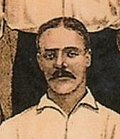Top Qs
Timeline
Chat
Perspective
List of England national football team captains
From Wikipedia, the free encyclopedia
Remove ads
155 people have officially served as captains of the England national football teams. The current captains are Harry Kane (men's) and Leah Williamson (women's).
England's men's and women's captains, Harry Kane (left, pictured in 2023) and Leah Williamson (right, pictured at a 2022 friendly)
The first England captain was Cuthbert Ottaway; he captained England in the first ever international match, against Scotland on 30 November 1872. He went on to captain England on just one further occasion, the third international match, on 7 March 1874, against the same opposition. Alexander Morten captained England in their first international on home soil, 8 March 1873, also against Scotland, and was the first international captain to win a match. Having previously played for Scotland against England,[1] this was his only international appearance for England. Morten remains England's oldest captain.
The first unofficial women's international match was contested by England and France in 1920, with the Dick, Kerr Ladies "England" side captained by Alice Kell.[2] The England women's team was authorised in 1972 by the Women's Football Association (WFA), originally unaffiliated with the Football Association (FA), and had Sheila Parker as its first captain. The official England women's first international match was played against Scotland on 18 November 1972, in anticipation of the centenary of the equivalent men's match. Parker remained in her role for four years before being left out of the 1976 British Home Championship; her replacement, Carol Thomas (née McCune), was only 20 when she took the armband,[3] and retained it for nearly a decade. Women's players between 1972 and 1993 were not all officially recognised until 2022; there were also several prior to 1972, who were not sanctioned and are not recognised. Thomas is England's youngest official captain under the WFA; Keira Walsh is England's youngest official captain under the FA; Carol Wilson and Casey Stoney unofficially served as captains when younger than Thomas and Walsh.[a]
Billy Wright set the record for most captaincies of his country in 1959, with 90. Bobby Moore, who remains England's youngest men's captain and the only England captain to have lifted the World Cup, reached 90 captaincies in 1973, sharing the record with Wright. Steph Houghton has the record for captaincies of the women's team, and outright fourth-most caps as captain (72) behind Wright and Moore, and Kane. Seven male players were captain in their only international cap, the last of these being in 1925. Williamson is England's only captain to have lifted the Euro, which she has done twice, and the only England captain to win a major trophy outside of England.[5]
Several women's matches have seen two players start as co-captains.[6][7] The most players known to wear the captain's armband for England in one match is four, which has happened twice. On 3 June 2003, Michael Owen started as captain with Emile Heskey, Phil Neville, and Jamie Carragher all wearing the armband.[8][9] On 30 November 2021, Millie Bright started as captain, with Ellen White, Keira Walsh, and Alex Greenwood also wearing the armband.[10][11]
Remove ads
Men's team
Captain chronology
- Bold indicates current captain
- Italics indicates still-active players
- Source unless specified:[12]
Captains by tournament
- Bold indicates tournament winners
- Italics indicates tournament hosts
- Source:[20]
Remove ads
Women's team
Captain chronology
- Bold indicates current captain
- Italics indicates still-active players
- indicates player was captain for matches under the Women's Football Association[h]
Captains by tournament
- Bold indicates tournament winners
- Italics indicates tournament hosts
Remove ads
Captains by appearances as captain
Summarize
Perspective
Figures include all recognised matches up to match played 27 July 2025. Only confirmed captaincies of named captains are counted.
The default order for this list is by most appearances as captain, then chronological order of first captaincy.
- Bold indicates permanent captain of England
- Italics indicates still-active players
- Sources unless specified:[k][12]
Remove ads
Captains by age
Summarize
Perspective
- Bold indicates permanent captain of England (not necessarily at time of the relevant match/es)
Youngest captains
Players who started as captain at under 25 years of age.[68]
Oldest captains
Players who started as captain at over 35 years of age.[70]
Remove ads
Others
Summarize
Perspective
Disputed captains
These players may have officially captained England, but sources are either uncertain or differ.
Unofficial captains
The following players have never been named, i.e. started a match as, captain, but were given the armband partway through a match after that game's captain was either sent off or substituted. As records for such mid-game changes are not often kept, this list may be incomplete:
Amateurs
For a period after the introduction of professionalism, the England team split into two teams that represented the nation internationally, one only including amateur players. This or other amateur English teams also represented Great Britain at the Olympics, when known as "England" in certain early competitions.[y]
Captains of other non-official teams
Before the men's and women's teams each became officially associated, different teams represented them in international tournaments.
- Bold indicates tournament winners
Non-official captains by appearances as captain
The following players have never captained England officially, but have started a match as named captain of a team representing England, with the match and/or team not officially recognised:
Only known, confirmed, non-official caps as captain are included.
Others by age
- Bold indicates permanent captain of England (not necessarily at time of the relevant match/es)
Unofficial young captaincies
Unofficial old captaincies
Remove ads
Notes
- In 2004, after the unofficial captaincies of Wilson (1971) and Stoney (2003), and after Thomas' WFA career as captain (1976–85), The Guardian named Bobby Moore as "still the youngest ever England captain".[4]
- Reserve captains are players that have taken the captain's armband on a one-off match basis when the incumbent permanent captain is unavailable. Unlike unofficial captaincies the player is given the responsibility prior to the game and is officially recognised by the FA as having officially captained England, whereas unofficial captains receive the armband part way through a match due to the substitution or the receiving of a red card by the captain.[13]
- Bloomer captained two successive games in 1902, with the first, on 5 April 1902, seeing the 1902 Ibrox disaster occur. This match was, afterwards, declared null and void by the Football Association.
- The Women's Football Association fielded their first England team in 1972, and was the governing body of women's football in England until the Football Association incorporated the team in 1993, marking a change in the formal organisation of it.[21] Few of the international matches contested by the team were considered official.[22] In 2019, women's sports history researcher Jean Williams found that "many of the games before 1993 were not recognised as official internationals, [...] and, though recognised by the FA with a virtual cap as representative games, many women players do not have more than one or two caps for their country as a result."[23] The WFA had so little funding that one woman hand-stitched caps for players.[23] The FA announced in 2022 that it would seek to recognise all former women's internationals.[24]
- Contemporary to the end of her career, the Guinness Book of Records listed Thomas with 49 caps as captain from 56 overall international caps,[57] which it repeated in every edition through 1990.[58] When Thomas was inducted into the English Football Hall of Fame in 2021, they reported 51 caps as captain, still from 56 international caps.[59] Thomas has stated that the only match she did not captain between first taking the armband and retiring was a 17 August 1985 game against Wales.[23]
- Casey Stoney was first handed the captain's armband on an unofficial basis on 25 February 2003 (age 20) when captain Karen Walker was substituted off;[62] this captaincy is not counted as she was not named/did not start as captain. She first made an appearance as a named captain, starting the match as captain (as reserve for Faye White), on 7 March 2009 (age 26).
- Cole was never a formal reserve or vice captain, but started with the armband as a gesture to celebrate his 100th cap. The match was actually Cole's 102nd cap, and there was reported surprise that he accepted the offer, as he had previously scorned the captaincy.[64]
- Duggan took the place of captain Steph Houghton so that Houghton could defer her 100th England cap by a match to play it at home rather than away. Other recent stand-in captains were unavailable — Keira Walsh was injured,[65] Lucy Bronze also did not travel, and Jordan Nobbs was an unused substitute[66] — and manager Phil Neville said Duggan's importance in the team was cause for her selection.[67]
- Captained amidst injury absences and on the occasion of his 50th cap.[18]
- WFA era
- The FA announced in 2022 that it would award caps to the 1972 first official women's team, including captain Parker.[24]
- Most of the time, the Amateurs were known as "England Amateurs". Those captains, as well as those representing teams known as "Great Britain", including recent Great Britain Olympic; past United Kingdom; and all British Universiade teams, are not included.
- Women were banned from top flight football in England until 1972, with the early pseudo-international British Independents teams specifically disavowed and blacklisted.[96]
Remove ads
References
External links
Wikiwand - on
Seamless Wikipedia browsing. On steroids.
Remove ads

























































